
Writer: Giri Arnawa, ASEAN Sustainable Agrifood Systems Indonesia
When Cambodian biocontrol supply agent met Indonesian biocontrol producers and suppliers, cash will flow, and Cambodian farmers will earn benefits from the use of Indonesian made biocontrol products.
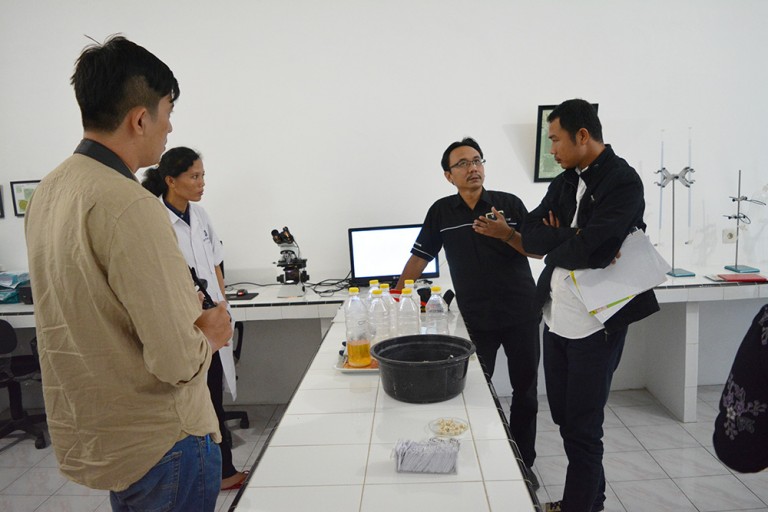
A recent trip of Eco-Agri Centre (EAC) representatives from Cambodia to Indonesia promised a bright future of biocontrol market between the two countries. The EAC representatives spent a half day with delegates from Indonesia Bio-Agro Input Association (ABI) in Medan, North Sumatera, Indonesia on 22 March 2016 at a know-how workshop on “Cambodia-Indonesia Market Initiation for Bio Agro Input Products” to discuss possibilities for further collaboration to promote sustainable agriculture practice through biocontrol products as a solution for long-term food security.
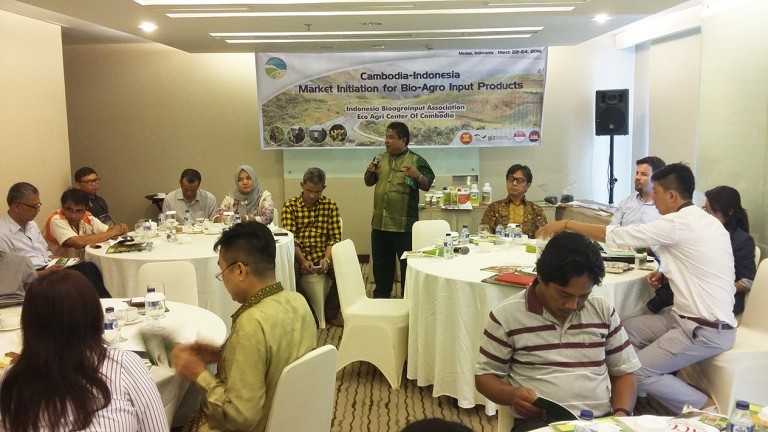
Vice Director of EAC Cambodia, Ms. Mao Canady, said: “The Eco-Agri Centre (EAC) is looking to build a network of bio-agro input producers and suppliers in Indonesia, and strengthen the value chain needed to provide and promote such products in Cambodia. The EAC will go a step further to sell the chemical-free pesticides to farmers to support the growing trend of organic products and farming techniques.”
Opened in March 2016 in Phnom Penh, Cambodia, the EAC is a joint initiative of GIZ Cambodia through ASEAN Sustainable Agrifood Systems (ASEAN SAS) project, and the Khmer Organic Cooperative. The centre provides complete services to link organic farmers to markets by training farmers on organic farming at no cost, making chemical-free products available for sales, and creating market channels for the healthy products.
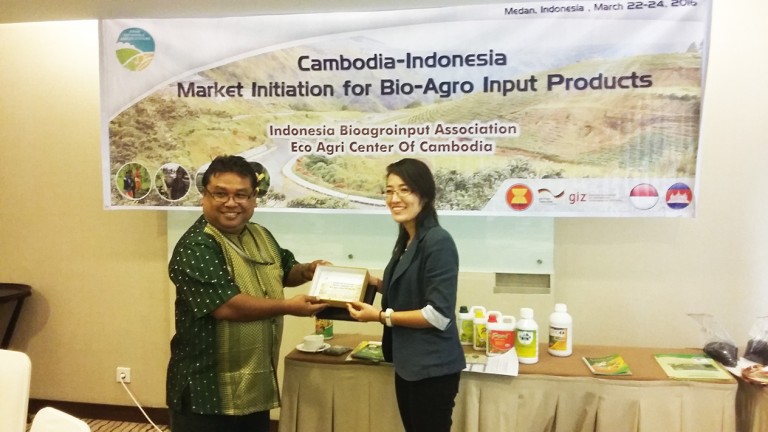
The half day bio-agro input market initiation workshop was participated by bio-input producers and suppliers who are members of ABI Indonesia, and two Malaysia’s bio-input producers who produce Electronic Fertilizer and Slow Release Fertilizer Product. ABI was established in 2008 with support from a Commercialization of Biopesticides in Southeast Asia project in promoting biocontrol products for crop protection. ABI provides assistance to small-and-medium-size bio fertilizer and bio pesticide producers and suppliers on registration and legal consultation and promotes the use of bio-agro input products to farmers. To date there are 51 registered bio-agro input products from 18 companies under ABI.
The workshop tied a good cooperation between the two parties in jointly promoting cross-border value chains of bio-agro input products.
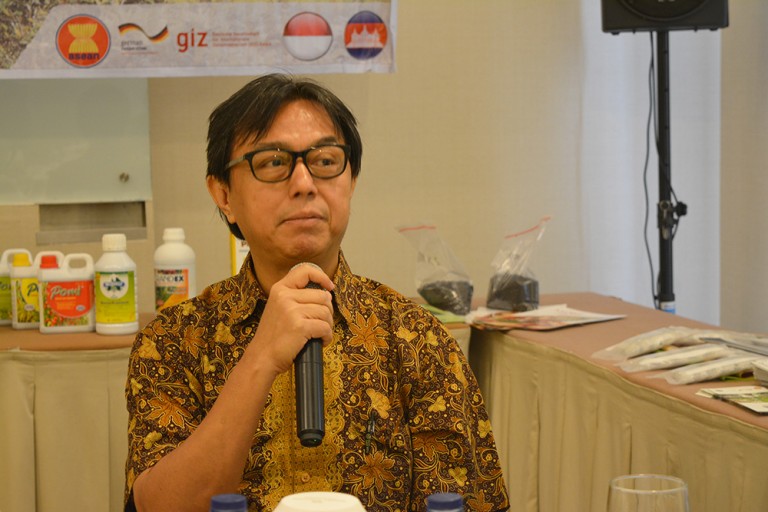
On behalf of ABI Indonesia’s members, Secretary General of ABI, Mr. Elianor Sembiring expressed his gratitude to the EAC delegates upon the visit and a business opportunity and cooperation in the future in the field of biological farming input products.
Chief Operation Officer of PT. Indo Acidatama Tbk, Mr. Hartanto who expressed his willingness to invest and expanding his factory in Central Java to produce bio-organic fertilizers in Cambodia said: “I hope this mutual partnership initiation will provide relevant benefits and develop the economies of both countries between Indonesia and Cambodia in particular, and in ASEAN countries in terms of keeping in view the environment aspect.”
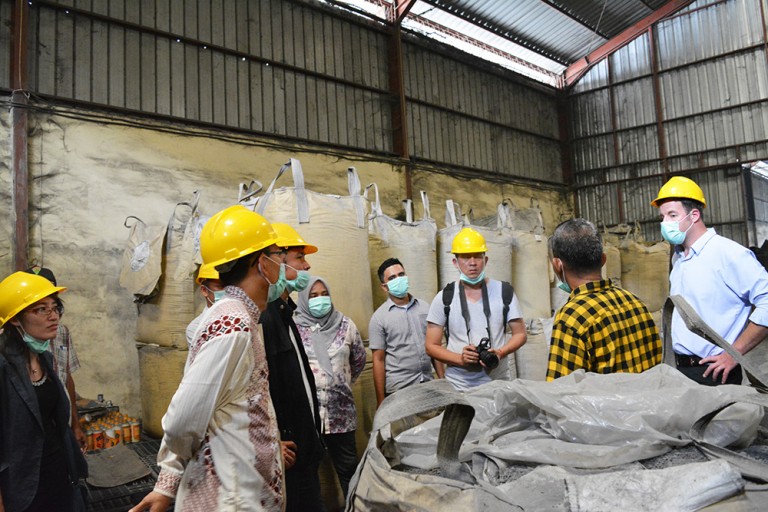
After the half-day workshop, the EAC representatives visited a bio-fertilizer factory of PT. Agro Tani Marisi in Medan that produces granule and liquid organic fertilizer. Owner, Mr.Tulus Sitorus introduced a chain process of production including sourcing of raw material from coffee waste, sugarcane waste, manure of cows, and magnesium from mining. The EAC representatives expressed interests for the future cooperation and offered to supply these biocontrol products to Cambodia.
“I will provide a good quality product with competitive price, as well as samples of product to be tested and demonstrated to organic vegetable farmers in Cambodia.” said Mr. Sitorus.
The EAC representatives also visited PT HETTS Biolestari which produces biological rodent control. The product is rat bait that contains living stages of the single celled parasites Sarcocystis singaporensis. Naturally, the parasite lives in certain snakes and rodents and is harmless for its hosts.
The “Cambodia-Indonesia Market Initiation for Bio Agro Input Products” trip was facilitated and supported by GIZ’s ASEAN SAS Indonesia and Cambodia.
“It was a great experience indeed what we have gained from the trip to Indonesia for the market initiation on bio-agro input products with members of ABI Indonesia,” said Ms. Canady from the EAC.
